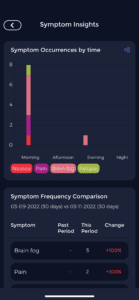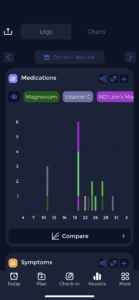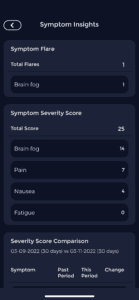
Brain fog is often the result of living in the century of speed, where everything happens at a fast pace and we have to process an unbelievable quantity of information every day. It includes a multitude of manifestations, including concentration difficulties, memory impairment and a general fogginess (lack of mental clarity). This is why it is important to track and manage your brain fog, this means figuring out what is causing it and preventing it. Getting rid of brain fog is possible, it just takes time to discover the cause, but CareClinic helps speed up the process.
Also named mental fatigue, brain fog is often found in people who suffer from other medical issues, including depression and anxiety. Depending on the severity of the brain fog, one might be prevented from engaging in regular activities (work, school, or personal). Lifestyle changes, along with treatment or therapy for the associated conditions, can help you get rid of such problems and return to living a normal life.
What is brain fog?
You have to take a good look at the way we live nowadays. Our diet is often unhealthy, containing too many processed foods and meat filled with antibiotics. We work too much and exercise too little, switching from one task to the other, without taking a pause. And all of these things affect our brain health.
Brain fog is a common occurrence in those who suffer from vitamin, mineral or nutrient deficiency. It appears in relation with the excess consumption of sugar, sleep deprivation and chronic stress, causing us to experience low levels of energy. The brain needs rest and relaxation, as well as a diet rich in vitamins, minerals, glucose, amino acids and essential fatty acids. Oftentimes, you can avoid brain fog by changing your lifestyle.
What does brain fog feel like?

How does brain fog manifest?
People who suffer from brain fog often experience low levels of energy and a general state of mental fatigue. They are easily distracted and battle mood swings, finding it difficult to concentrate on daily activities and even to communicate.
As a result of the brain fog, they might also become irritable and suffer from headaches or migraines. The presence of these symptoms will cause their motivation to decrease, with depression and anxiety reinforcing the severity of the manifestations. One might also suffer from insomnia and be in a permanent state of confusion.
What are the causes of brain fog?
Asking yourself “why does my brain feel foggy” often? One of the main causes of brain fog is chronic stress, which can lead to mental fatigue and make it harder for one to think or focus. Sleep deprivation, whether it appears on its own or as a result of co-existent conditions, can affect the functioning of the brain and increase the risk of concentration difficulties, forgetfulness, etc.
Hormonal changes have been known to trigger brain fog, including during pregnancy, menopause or even as a result of PMS. Diet is another factor contributing to the appearance of such problems. A significant problem is vitamin B12 deficiency but both food allergies (peanut, diary) and sensitivities to artificial ingredients (MSG, aspartame) can lead to brain fog.
Brain fog can appear as a side effect of various medications, in which case it will be necessary to change the respective drug or at least lower the dosage. It can be caused by cancer treatments, such as chemotherapy and appear as a result of co-existent conditions, such as Alzheimer’s disease, chronic fatigue syndrome, fibromyalgia, anemia, diabetes, hypothyroidism and autoimmune conditions (lupus, multiple sclerosis, arthritis).
The conditions that have brain fog as one of the manifestations are generally the ones where fatigue and inflammation are the primary changes. These can affect the brain and its function. Autism, Sjögren’s syndrome and dehydration can lead to this issue as well.
Alcohol and caffeine abuse can favor brain fog, as well as the excess consumption of refined carbs. Dehydration and prolonged standing are two other potential causes of brain fog. Fear not, we now discuss how to get rid of brain fog using a multitude of various ways below.
How is brain fog diagnosed?
In making the diagnosis of brain fog, the doctor will perform a physical exam, so as to identify conditions that might lead to such problems. You will also have a conversation with regard to your daily diet, current treatment, physical activities and mental health.
The doctor will ask about the symptoms experienced, aside from the brain fog. For example, if your nails are brittle, the skin dry, you’ve gained weight and suffer from hair loss, you might be suffering from hypothyroidism. Blood tests might be recommended, in order to see glucose levels and identify any nutritional deficiencies.
For a more advanced diagnosis, you might be recommended imaging studies, such as X-rays, CTs or MRIs. A sleep study can be performed in order to determine the cause of your insomnia, which might further lead to brain fog. You might also be advised to keep a food journal, so as to determine whether your diet is the cause of the brain fog or not (food allergy brain fog).
Management of brain fog
If you are wondering how to clear brain fog, you should start with the cause. There is no quick fix for this issue but, upon treating or addressing the cause, you might feel better. Moreover, you have to be willing to make a number of lifestyle changes, so as to eliminate the disease of being busy.
Treatment for co-existent conditions

Provided you suffer from depression and/or anxiety, you might be directed toward cognitive behavioral therapy or other similar therapies. These are meant to help you change your negative thought pattern into a positive one, building stress resilience and learning how to clear brain fog. For more severe cases, you might be advised to take antidepressants, such as Wellbutrin. Manage your pill reminders with CareClinic to view reports on progress.
Modafinil for brain fog
Modafinil is a wakefulness-promoting agent that has been shown to be effective in treating brain fog. As brain fog is a condition characterized by difficulty concentrating, memory problems, and mental fatigue. Modafinil has been shown to improve cognitive function in people with sleep disorders, such as narcolepsy, and can also be beneficial for people who do not have sleep disorders but experience brain fog.
The exact mechanism by which modafinil improves brain function is not fully understood, but it is thought to work by increasing the amount of dopamine in the brain. Dopamine is a neurotransmitter that plays an important role in cognition and motivation.
Brain fog anxiety symptom
If you find yourself feeling foggy and unable to focus, it may be due to anxiety. Anxiety can lead to a racing mind and constant worries, which can make it hard to concentrate on anything else. CBT (cognitive behavioral therapy) and other forms of therapy can help you learn how to manage your anxiety and break the cycle of negative thinking.
Vitamins & Supplements
In the situation that the blood tests have revealed you suffer from a nutritional deficiency, supplements might be prescribed. You might also have to change your diet, so as to include more fresh fruits and vegetables, as well as more proteins and healthy fats. Vitamins can come from both supplements and diet, especially in case of severe nutritional deficiencies. You can learn how to track your vitamin and supplements here.
Herbal remedies can improve the functions of the brain, helping you say goodbye to brain fog. For example, you might consider Bacopa Monnieri, an ancient herbal remedy that is known to improve memory, concentration, and brain health in general. CBD oil is especially recommended for those who suffer from brain fog as a result of insomnia, promoting restorative sleep.
Best Supplement for Brain Fog
The best supplement for brain fog is omega-3 fatty acids. Omega-3 supplements help to improve cognitive function and memory. They also protect the brain from age-related damage and improve blood flow to the brain. They do this by reducing inflammation and improving cell function.
Other supplements include Vitamin b12, magnesium, and Rhodiola Rosea. These supplements can also help to improve cognitive function and memory. A B-complex supplement contains all of the B vitamins. These vitamins are important for brain health. Vitamin B12 is especially important for cognitive function because it helps to produce myelin, which is a substance that protects nerve cells.
Magnesium works by reducing inflammation and improving blood flow to the brain. Rhodiola Rosea helps to improve mood and reduce stress. You can also try herbal remedies such as Ginkgo Biloba and Gotu Kola. Ginkgo biloba improves blood circulation to the brain and protects against age-related damage. Gotu kola has been shown to improve cognitive function and memory. There are many other supplements that can help to improve brain function and memory. If you are having trouble finding the right supplement for you, speak to a healthcare professional. They will be able to advise you on the best course of action.
Sleep hygiene is important to reduce brain fog
Insomnia is considered one of the main factors that contribute to the appearance of brain fog. Paying attention to sleep hygiene can help you work out such problems and wake up well-rested in the morning. You should go to sleep and wake up at approximately the same hours, avoiding screen time before bed. The same goes for alcohol, caffeine or heavy meals. Also, make sure that the room in which you sleep is well-ventilated.
Stress management helps with Brain Fog
As stress can lead to brain fog, you have to be responsible and learn how to manage stress. You can visit a therapist and discover the most effective stress management techniques, as well as additional solutions (meditation, mindfulness, etc.). A good way to release stress is through the practice of pleasant hobbies or by engaging in enjoyable activities.
Managing Your Stress Response
First, it is important to identify the sources of your stress. Once you know what is causing your stress, you can then begin to develop a plan to manage it. For some people, managing stress may mean making lifestyle changes, such as reducing their workload or taking breaks more often. Others may find that they need to seek out professional help in order to learn how to effectively manage their stress. Regardless of the approach that you take, it is important to remember that managing stress is an ongoing process and not something that you can simply “fix” overnight. By taking the time to identify the sources of your stress and develop a plan to manage it, you can begin to see improvements in your energy levels and brain function.
To relieve stress consider taking a break from your normal routine and doing something that you enjoy. Limit your intake of caffeine and alcohol and most importantly talk to someone who can help you manage your stress (such as a therapist or counselor). A therapist or counselor can assist you in developing coping mechanisms and strategies to better deal with stress. With the right support, you can learn how to effectively manage your stress and improve your overall health and well-being.
Keep the brain young
Brain fog is more common in older people, but the good news is that you can improve your mental clarity easily. You can keep the brain young and free of the fogginess sensation by doing puzzles, brain games and so on. What matters is that you keep on stimulating those grey cells, improving your memory, cognition and other essential functions.
Maintain a Healthy Diet & Nutrition
A healthy diet can help you eliminate brain fog and feel better overall. You should always opt for fresh fruits and vegetables, high-quality fats and avoid foods that have been extensively processed or those rich in sugar, preservatives, or artificial ingredients.
Keep in mind that your diet influences the way the brain functions and pay more attention to your meals. For the best possible state of health, you might want to consider following an anti-inflammatory diet. You should also watch your sugar intake and consume more complex carbs as part of your daily diet.
By cutting back on packaged and processed foods, you can eliminate the brain fog induced by sugar addictions. As an alternative, you can consume more brain foods, such as fatty fish, whole grains, yams, sweet potatoes, and dairy. Foods rich in antioxidants can keep dementia and neurodegeneration at a safe distance, such as berries for example. Remember that the brain needs healthy fats to function – you should eat more eggs, grass-fed beef, nuts and seeds, poultry, etc.
Note: if you have decided to follow the ketogenic diet, you might deal with the keto brain fog. However, this is only a temporary effect, as the body – and especially the brain – becomes accustomed to using ketone bodies instead of glucose as the main fuel.
Ketogenic Diet to Reduce Brain Fog
There are several theories about how the ketogenic diet works to improve brain function. One theory suggests that by reducing carbohydrates, the diet forces the body to burn fat for energy, which produces ketones. These ketones are then used by the brain as an alternative fuel source. This theory is supported by studies showing that the ketogenic diet increases levels of ketones in the blood and improves brain function in people with Alzheimer’s disease and other neurological disorders.
Another theory suggests that the ketogenic diet helps reduce inflammation in the brain. Inflammation has been linked to many neurological disorders, including Alzheimer’s disease, Parkinson’s disease, and brain cancer. The ketogenic diet may help reduce inflammation by reducing levels of pro-inflammatory molecules called cytokines.
A third theory suggests that the ketogenic diet helps protect the brain by reducing oxidative stress. Oxidative stress is a process that damages cells and is thought to play a role in the development of many neurological disorders. The ketogenic diet may help reduce oxidative stress by increasing levels of antioxidants in the body. There is growing evidence that the ketogenic diet may offer benefits for people with various neurological disorders. However, more research is needed to confirm these potential benefits.
Exercise & Physical Activity
Physical exercise has excellent anti-inflammatory properties and it is beneficial for the brain, as it reduces the levels of stress hormones and fills you up with energy. It can also balance hormones and support the release of endorphins.
Tracking Your Treatment Journey with CareClinic

The application is useful for recording all of the treatments, therapies and supplements recommended for brain fog. You can set up individualized reminders for both the treatment and your various appointments so that you can get better in no time.
Thanks to the built-in journal, you might also be interested to know that the App allows you to write about your feelings. This is a great feature, as you can later review these entries and find out what contributes to the brain fog in the first place.
CareClinic’s health app allows you to stay organized and in control of your health. You may view your health logs, reports and correlations at any time. This report can be shared with the physician or therapist so that adjustments or changes can be made to your treatment for brain fog.
How long does brain fog last?
If you address the underlying cause of brain fog, there is no secret to clear brain fog instantly. The most important thing is that you persevere and keep track of your manifestations, working together with your physician to reach an accurate diagnosis and be treated accordingly.
Brain fog can be caused by a variety of things, including poor diet, lack of exercise, and stress. A healthy diet and regular exercise can help to reduce brain fog. There are also some specific foods that can help to improve brain function. If you think you may be suffering from brain fog, it is important to track your symptoms and speak to a doctor. With the right treatment, you can clear your brain fog and feel better overall. Start now by trying the CareClinic app for iOS or Android to find correlations in what can be causing your brain fog or to share your reports with your doctor to help discover the correct treatment for your quicker.


